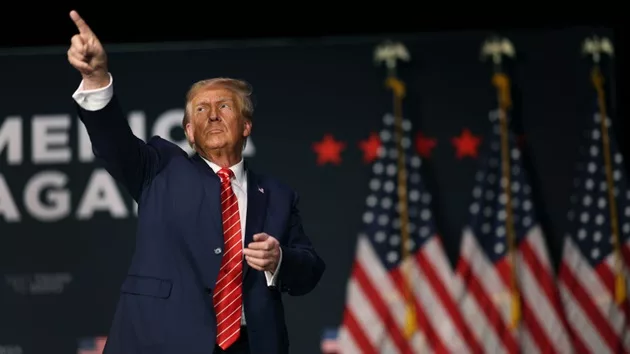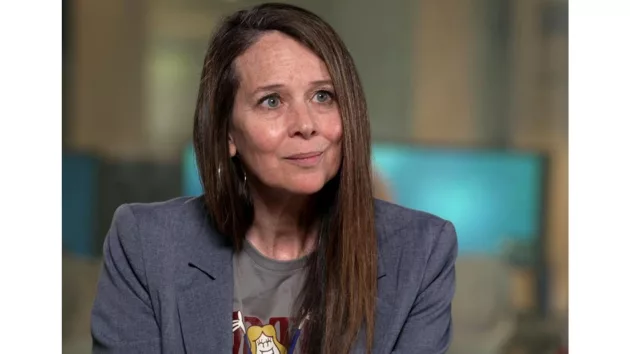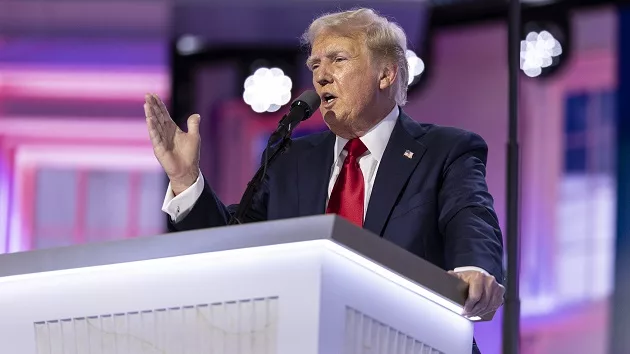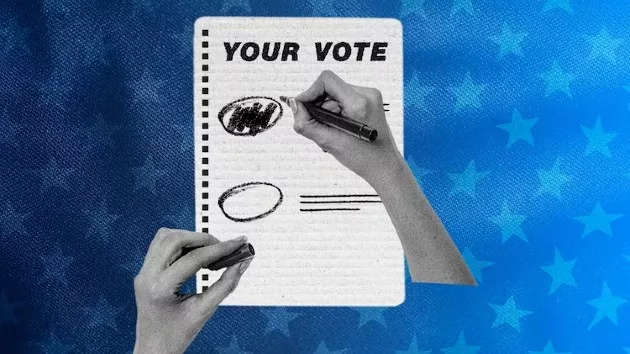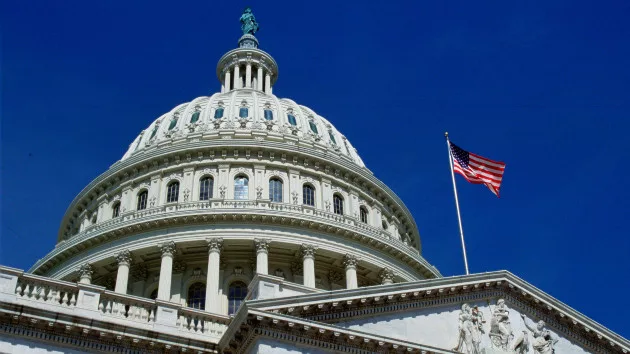(DENVER) — A watchdog group and a handful of Colorado voters on Wednesday continued to make their case for why the 14th Amendment disqualifies Donald Trump from running for president in 2024 because of his actions around the Jan. 6 attack on the U.S. Capitol while Congress was gathering to certify the 2020 election results.
Among the witnesses called so far during the historic five-day hearing in Denver were two police officers who were at the Capitol as well as experts on extremism and the history and context of the 14th Amendment itself — and how it might apply to Trump.
The former president and his attorneys have rejected the 14th Amendment argument outright.
The lawsuit against Trump, filed by six Republican and unaffiliated voters represented by the Citizens for Responsibility and Ethics in Washington (CREW), accuses him of inciting and aiding the mob at the Capitol two years ago, which he denies. He was impeached on similar charges but acquitted by Republicans in the Senate.
Over the past few months, efforts to bar Trump from the Republican primary ballot under Section 3 of the 14th Amendment, which was first enacted after the Civil War, have gained traction in a few states. A hearing is set for Thursday in Minnesota on a similar 14th Amendment complaint against Trump.
Section 3 of the amendment states that someone isn’t eligible for future office if, while they were in office, they took an oath to support the Constitution but then “engaged in insurrection or rebellion against the same, or [gave] aid or comfort to the enemies thereof,” unless they are granted amnesty by a two-thirds vote of Congress.
Supporters of this theory argue it applies to Trump because of his conduct after he lost the 2020 election but sought to reverse the results, including on the morning of Jan. 6, 2021. Trump maintains he did nothing wrong.
Trump’s attorney Scott Gessler, a former secretary of state for Colorado, said in his own opening remarks for the hearing, on Monday, that the suit is “anti-democratic.”
“It looks to extinguish the opportunity … for millions of Coloradans, Colorado Republicans and unaffiliated voters, to be able to choose and vote for the presidential candidate they want,” Gessler said.
Rep. Troy Nehls, a Republican from Texas, announced on social media on Tuesday that he will testify in Trump’s disqualification trial on behalf of the former president. Nehls claimed that there was “no insurrection” and that the trial was a “sham.” It’s unclear when he will be called as a witness.
CREW began its case by calling two police officers who were at the Capitol during the Jan. 6 rioting and California Rep. Eric Swalwell, a Democrat, who was inside.
“The events on Jan. 6, 2021, in the United States Capitol were horrific. It was a terrorist attack on the United States of America, an assault on democracy and an attempt to prevent the peaceful transfer of power,” one of the officers, Danny Hodges, testified on Monday.
On Tuesday, CREW called Dr. Peter Simi, a professor of sociology at Chapman University, to discuss political extremism.
Simi — who had also testified in a trial against organizers of the deadly “Unite the Right” rally in Charlottesville, Virginia in 2017 — spoke about some of the groups involved in the Jan. 6 riot, such as the Proud Boys and Oath Keepers, and said that their invocation of the term “1776” in plans for that day was a violent call for revolution.
Simi has done 217 interviews with right-wing extremists throughout his career, including with some with members of the Proud Boys and Oath Keepers, he said.
A significant portion of Simi’s testimony, which lasted most of the second day, was used reviewing video footage of Trump’s past speeches.
The professor argued that Trump had endorsed political violence through “double speak”– suggestions used as empty gestures designed to support deniability of his true intentions.
During cross-examination with Gessler, Trump’s lawyer, more clips of the former president were played, including when he condemned Nazis and white supremacists after the Charlottesville rally.
Trump, however, infamously also said in the wake of the rally that “I think there is blame on both sides” and while “you had some very bad people” who attended the rally, “you also had people that were very fine people, on both sides.” (In subsequent years, Trump has repeatedly defended those comments, including telling ABC News in 2019 that he “answered perfectly.”)
During the last leg of Simi’s testimony, on Tuesday, Gessler showed a video montage of various leading Democrats, like Vice President Kamala Harris, using the word “fight” in political speeches.
Simi said they were not invoking violence among far-right extremists.
After his testimony, Bill Banks, the founding director of the Institute for National Security and Counterterrorism at Syracuse University and a professor emeritus at Syracuse University College of Law, appeared as a witness.
Wednesday began with CREW presenting its remaining witnesses.
Gerard Magliocca, a law professor at Indiana University, testified about the phrase “insurrection” and the history and meaning of Section 3 of the 14th Amendment. Ahead of the hearing, presiding District Judge Sarah Wallace had outlined that as a key topic to examine.
During the post-Civil War period in which the 14th Amendment was adopted, engaging in insurrection was understood broadly to include any voluntary act in furtherance of an insurrection against the Constitution, including words of incitement, Magliocca testified.
The U.S. attorney general at the time language had described engaging in insurrection as some direct overt act done with the intent to further the rebellion, Magliocca said.
After his appearance, Hillary Rudy, an elections official with the Colorado Department of State, took the stand.
Trump’s team is expected to begin their presentation later on Wednesday.
Gessler, his attorney, told reporters this week that they have about nine witnesses.
“Their case is incredibly weak,” he said on Monday.
He has contended that Trump did not engage in the violence on Jan. 6 and noted that Trump encouraged supporters to protest peacefully at the Capitol that day.
During a speech near the White House earlier on Jan. 6, Trump also repeated his baseless allegations that the 2020 election was fraudulent and said, “If you don’t fight like hell, you’re not going to have a country anymore.”
Simi cited Trump’s comments that day in his testimony on Tuesday: “For far-right extremists, there’s a clear message that fighting was the clear message. Not being peaceful.”
Copyright © 2023, ABC Audio. All rights reserved.


